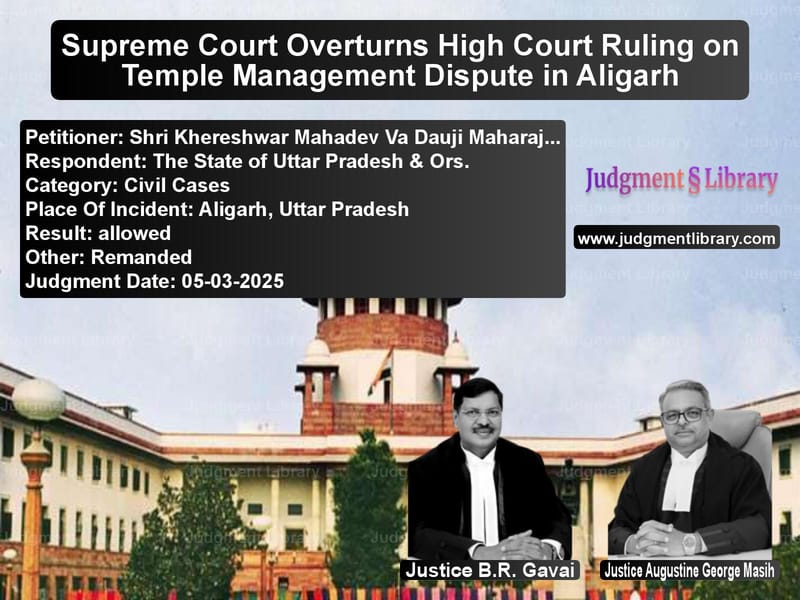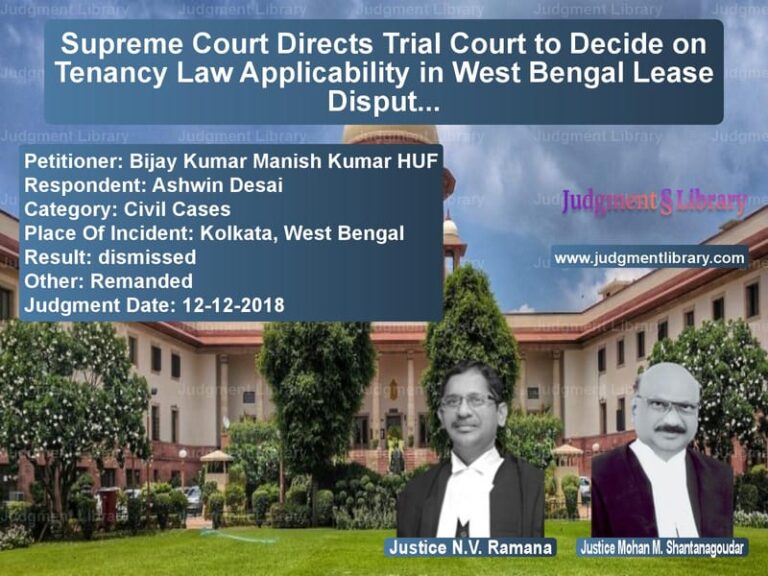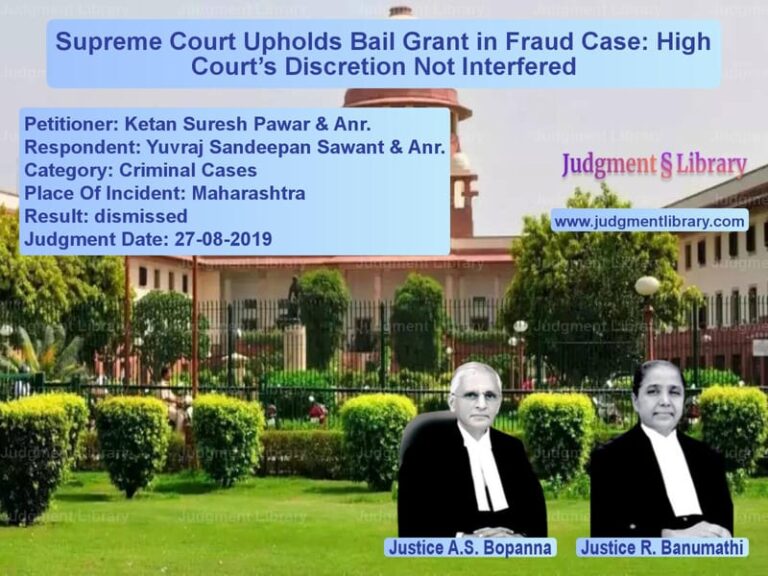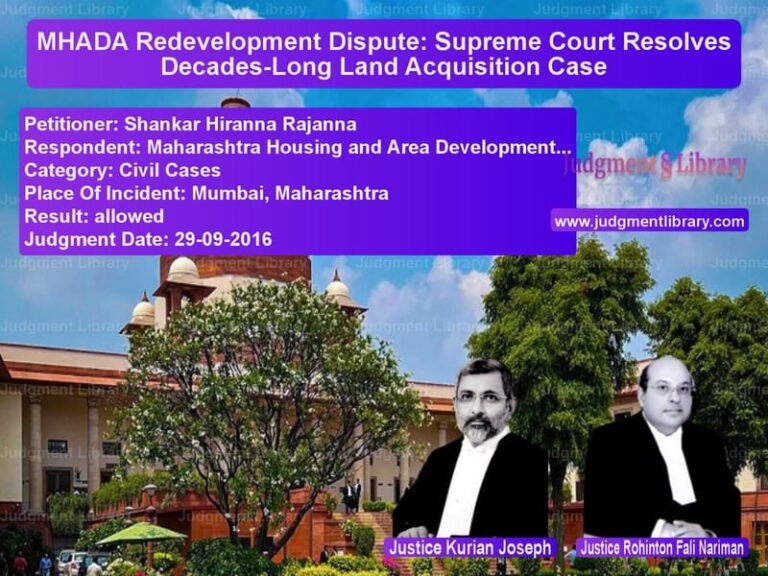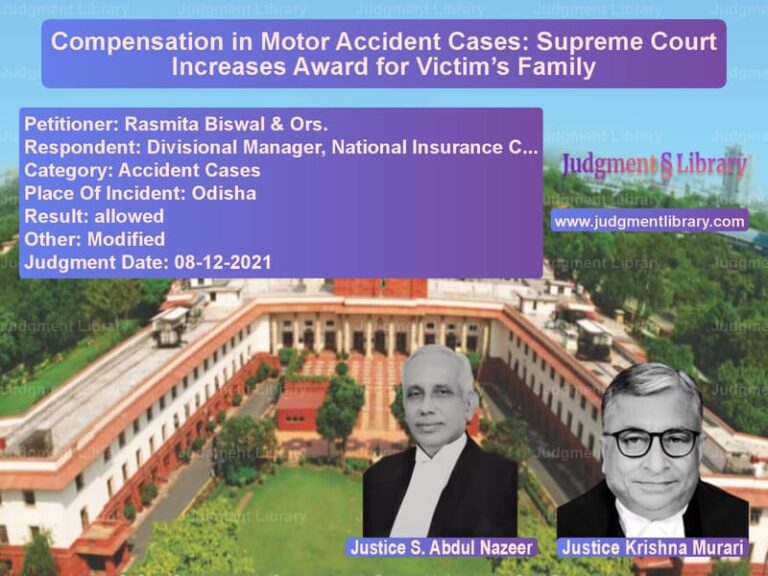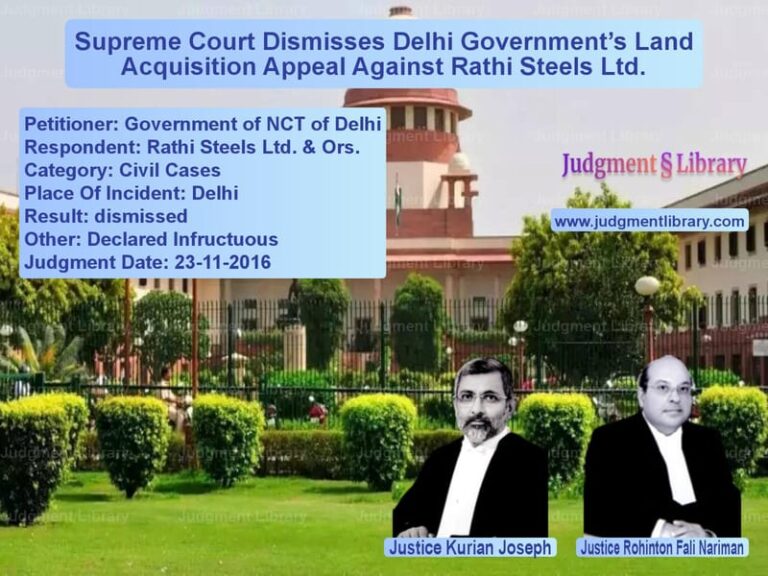Supreme Court Overturns High Court Ruling on Temple Management Dispute in Aligarh
The long-standing dispute over the management of the Shri Khereshwar Mahadev Va Dauji Maharaj Temple in Aligarh has finally reached a conclusion with the Supreme Court delivering a significant ruling on March 5, 2025. The case, titled Shri Khereshwar Mahadev Va Dauji Maharaj Samiti vs. The State of Uttar Pradesh & Ors., involved conflicting claims over the temple’s administration and property ownership.
The litigation was rooted in a dispute between different committees asserting control over the temple. The petitioner, representing the existing temple management, challenged an order by the Allahabad High Court that directed the transfer of possession to the Gram Sabha, Hardaspur. The case raised critical questions about the role of civil courts in religious property disputes, the rights of Gram Sabhas over public lands, and procedural fairness in judicial proceedings.
Background of the Case
The conflict began when the Gram Sabha of Hardaspur sought control over the temple premises, citing a 2007 order by the Sub-Divisional Magistrate (SDM) that granted possession to the local governing body. The appellant temple committee had been managing the temple affairs for decades and contested the validity of the order.
In 2012, the temple committee initiated Original Suit No. 623 of 2012 before the Additional Civil Judge, Senior Division, Aligarh, seeking an injunction against the Gram Sabha’s claim. The suit was dismissed, prompting an appeal before the Additional District Judge. On April 6, 2019, the appellate court ruled in favor of the temple committee, setting aside the lower court’s order and directing that any further proceedings include a review of additional documentary evidence.
Despite the ongoing litigation, Respondent No. 5, Manju Devi (the Gram Pradhan of Hardaspur), filed an application before the District Magistrate, Aligarh, seeking enforcement of the 2007 order. The District Magistrate requested a report from the SDM, who noted that a civil suit was pending and that no proceedings could take place under such circumstances.
However, in May 2023, the Allahabad High Court ordered the immediate execution of the 2007 order, directing that the temple premises be handed over to the Gram Sabha. The petitioner contended that the order was issued without granting them an opportunity for a hearing, leading them to approach the Supreme Court.
Arguments Presented by the Petitioner
The petitioner’s counsel, Shri Gagan Gupta, argued:
- The High Court’s ruling was passed ex parte without affording the temple committee a chance to present its case.
- The 2007 SDM order could not be enforced while the civil litigation was pending in the Additional Civil Judge’s court.
- The Allahabad High Court ignored a crucial 2019 ruling by the Additional District Judge, which had directed that documentary evidence must be reviewed before deciding the ownership.
- The Gram Sabha’s claim was based on misleading submissions that suppressed key judicial records.
Arguments Presented by the Respondents
The respondents, represented by Shri Atul Parmar, countered:
- The temple land fell within the jurisdiction of the Gram Sabha under Sections 34 and 35 of the Uttar Pradesh Panchayat Raj Act, 1947, which granted local bodies the authority to manage public properties.
- The 2007 order had already established the Gram Sabha’s right over the temple property.
- The Additional Civil Judge’s ruling did not bind the Gram Sabha as it was not made a party to the original suit.
Supreme Court’s Observations and Key Verbatim Arguments
The Supreme Court, in its judgment delivered by Justices B.R. Gavai and Augustine George Masih, made the following key observations:
“When a law requires a particular thing to be done in a particular manner, it has to be done in that manner alone or not at all. The High Court failed to consider the procedural fairness required in such disputes.”
“The Gram Sabha cannot assert rights over the property without due legal process. The temple committee, which has been managing the affairs for decades, must be given a proper opportunity to present its case.”
“If a dispute is sub judice before a competent court, no administrative authority, including the High Court, can intervene to enforce orders that are under judicial scrutiny.”
Final Judgment and Directives
The Supreme Court overturned the High Court’s order and ruled:
- The May 30, 2023 order of the Allahabad High Court was set aside.
- The 2019 appellate court ruling remained valid, directing that the civil suit be decided based on documentary evidence.
- The Gram Sabha was directed to be impleaded as a party in the pending suit before the Additional Civil Judge.
- The civil suit, Original Suit No. 623 of 2012, must be decided within six months.
- Until a final decision is reached, the status quo regarding temple management shall be maintained.
Impact of the Judgment
This ruling has significant implications for religious property disputes:
- Judicial Precedence Over Executive Actions: The verdict reinforces that judicial rulings must take precedence over administrative orders.
- Fair Hearing Requirement: Courts cannot pass orders affecting property rights without giving all affected parties an opportunity to present their case.
- Regulation of Temple Management: The ruling clarifies that control over temple properties cannot be transferred arbitrarily without following due process.
The decision provides clarity on the extent of Gram Sabha authority over temple lands and ensures that religious institutions are not deprived of their rights without procedural safeguards.
Petitioner Name: Shri Khereshwar Mahadev Va Dauji Maharaj Samiti.Respondent Name: The State of Uttar Pradesh & Ors..Judgment By: Justice B.R. Gavai, Justice Augustine George Masih.Place Of Incident: Aligarh, Uttar Pradesh.Judgment Date: 05-03-2025.
Don’t miss out on the full details! Download the complete judgment in PDF format below and gain valuable insights instantly!
Download Judgment: shri-khereshwar-maha-vs-the-state-of-uttar-p-supreme-court-of-india-judgment-dated-05-03-2025.pdf
Directly Download Judgment: Directly download this Judgment
See all petitions in Property Disputes
See all petitions in Landlord-Tenant Disputes
See all petitions in Specific Performance
See all petitions in Damages and Compensation
See all petitions in Judgment by B R Gavai
See all petitions in Judgment by Augustine George Masih
See all petitions in allowed
See all petitions in Remanded
See all petitions in supreme court of India judgments March 2025
See all petitions in 2025 judgments
See all posts in Civil Cases Category
See all allowed petitions in Civil Cases Category
See all Dismissed petitions in Civil Cases Category
See all partially allowed petitions in Civil Cases Category

